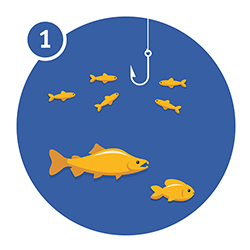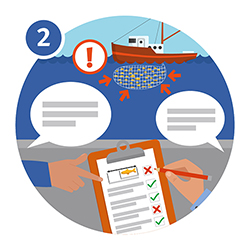Every few years we review the MSC Standards so they remain relevant. Industry practices and scientific understanding evolve over time, so our Standards need to evolve too.
Our Standard reviews are consistent with best practice codes and guidelines provided by the UN Food and Agriculture Organization (FAO), ISEAL and the Global Sustainable Seafood Initiative (GSSI). These reviews engage academics, fellow NGOs, governments and industry.
Standard reviews
The Fisheries Standard review
The Fisheries Standard Review (FSR) considers issues raised by stakeholders and data from our own monitoring and evaluation team. The aim of this review is to make sure scientific developments and fisheries management best practice are reflected in MSC certified fisheries.This review might also look at what we call the scope of the Fisheries Standard: what types of fishing activity can be assessed to the Standard.
The Fisheries Certification Process review
Every two to three years, we review the fishery assessment process, called the Fisheries Certification Process (FCP). This process reviews how academics, fellow NGOs, governments and industry are involved in fishery assessments. We also look at improving the efficiency of the assessment process.
We began a review of the Fisheries Certification Process in 2020, alongside the current Fisheries Standard Review.
Find out more about the Fisheries Certification Process review
The latest review was completed in 2020:
See our Summary of Changes
See the Stakeholder engagement report
The Chain of Custody Standard review
Every three to five years we review our Chain of Custody Standard, which consists of one default version and Group and Consumer-Facing Organisation versions. This enables us to respond to stakeholder concerns, market changes and advances in supply chain traceability best practice.The latest review was completed in 2019 – see our chain of custody documents for the latest versions.
How does Standard development work?

The MSC develops the MSC Fisheries, Seaweed and Chain of Custody Standards over time. We also regularly develop the process that certifiers use to assess fisheries and supply chain companies against our Standards.

An issue is put forward by a stakeholder or is raised by the MSC.

Issues are reviewed by the MSC, and some are taken forward. These issues are investigated by the MSC through research and a process of public consultation and stakeholder workshops.

The issue and proposals to develop the program are discussed by two groups:
1. The MSC's Technical Advisory Board, an independent panel of experts.
2. The Stakeholder Advisory Council, a council of MSC’s stakeholder groups and independent representatives.

These two groups provide advice and make recommendations to the Board of Trustees about the proposals.
The Board of Trustees make the final decision on whether to adopt developments into the program.
How you can get involved
Hundreds of people have been involved in shaping our Standards. Your expertise and insights can contribute to the development of the MSC Fisheries and Chain of Custody Standards.
There are two main ways to get involved in the Standard development process – you can identify an issue, or you can give feedback on an issue that's open for consultation.
Identify an issue
If there is some way you think our Standards or our certification system need to develop, please send us an email with as much detail as possible to [email protected].
How does the MSC respond to an issue?
- An issue is put forward by a stakeholder or is raised by the MSC.
- Issues are reviewed by the MSC, and some are taken forward.
- Issues are investigated by the MSC through dedicated research, evaluation and a process of public consultation and stakeholder workshops.
- Proposed revisions are tested to understand impact and usability.
- The issue is taken to the MSC Technical Advisory Board (TAB), an independent panel of experts. They review and make recommendations to the Board of Trustees. It is also taken to the Stakeholder Advisory Council (STAC) who advise on issue development. This council is made up of fisheries, supply chain companies and eNGOs.
- The program improvement must be accepted by the TAB and adopted by the Board, before being implemented.
What happens when you raise an issue?
We carefully assess every issue and decide if and when it enters into our development process.
How long does it take for issues to be resolved?
It takes time to make modifications to our Standards. Reasonable timeframes need to be allowed to give the issue due consideration and consultation, and ensure any changes are tested and implemented.
We also need to monitor and evaluate any changes that are introduced to make sure implementation is successful in achieving the intended outcome.
To make sure fisheries can adapt to changes they must be given time. The MSC is committed to the FAO Ecolabeling guidelines. These state that fisheries are given at least three years to adapt to changes to the Standard.
Engage in our consultations
There are two main consultation periods each year where we ask for your feedback on our Standards, around March and September. These periods can be 30 or 60 days in length.
How to participate in a consultation
When a consultation is open, we will email interested stakeholders. If you would like to be notified when consultation opens, please email [email protected] to be added to our mailing list. You can give your feedback on the project proposals in the consultation through an online survey. The survey is linked to from the MSC program improvements website along with all the resources you need to understand the project development.
You can always talk to the project lead if you need information and insights into the program development. Their contact details will be posted on the MSC program improvements website.
What happens after you give feedback in a consultation?
MSC staff consider every response we receive as we develop proposals. Your responses are read by the Technical Advisory Board and inform their recommendations.
All responses we receive on a program development are published anonymously on the MSC program improvements website.
We also provide a summary response on key issues raised. At the end of the project we will provide evaluation of process including summary of how main feedback themes were incorporated into revisions.
Past consultations
Search through the consultations that have helped develop the MSC Standards.
New Standards
Seaweed
The Seaweed Standard is a joint venture with the Aquaculture Stewardship Council (ASC) and was launched in 2017.
The ASC–MSC Seaweed Standard is the first international seaweed Standard to incorporate United Nations Food and Agriculture Organisation (UN FAO) guidelines and followed the ISEAL Standard Setting Code of Good Practice. The Standard was developed in consultation with academics, scientists, industry experts and conservation groups.
Mixed Fisheries Standard
The MSC is working to create a new standard for assessing fisheries that catch multiple species at the same time. The proposed standard will offer greater efficiency and improved accessibility to the MSC program for such fisheries.
| Description: | How we review and revise existing MSC Standards and develop new MSC Standards. |
|---|---|
| Language: | English |
| Version: | 5.00 |
| Date of issue: | 05 July 2018 |

